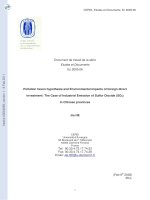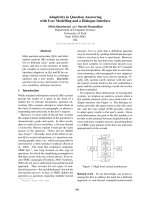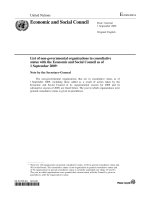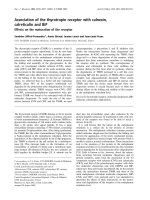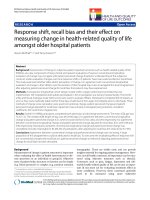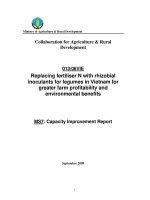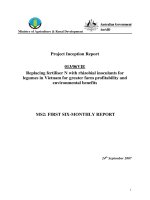Proactive personality genetic influences in its relationships with career success and environmental impacts on its change
Bạn đang xem bản rút gọn của tài liệu. Xem và tải ngay bản đầy đủ của tài liệu tại đây (1.09 MB, 112 trang )
PROACTIVE PERSONALITY: GENETIC INFLUENCES IN ITS RELATIONSHIPS
WITH CAREER SUCCESS AND ENVIRONMENTAL IMPACTS ON ITS CHANGE
WENDONG LI
(PhD)
A THESIS SUBMITTED FOR THE DEGREE OF DOCTOR OF PHYLOSOPHY
DEPARTMENT OF MANAGEMENT AND ORGANIZATION
NATIONAL UNIVERSITY OF SINGAPORE
2013
i
DECLARATION
I hereby declare that this thesis is my original work and it has been written by me in its
entirety. I have duly acknowledged all the sources of information which have been used in the
thesis.
This thesis has also not been submitted for any degree in any university previously.
Wendong LI
April 1, 2013
ii
ACKNOWLEDGEMENTS
I am grateful to my supervisors, Richard D. Avery, and Zhaoli Song, for the guidance, support,
and enthusiasm provided during my PhD study. I would also like to express my gratitude to my
committee members, Michael Frese and Jayanth Narayanan, for insightful discussions and
various types of help offered during the completion of this dissertation. I thank other faculty
members at Department of Management and Organization, National University of Singapore for
their intellectual stimulation in various courses and personal discussions. I have learned a lot from
you!
I dedicate this dissertation to my family, my parents, my sister, and my wife, for their long-lasting
support, which is indescribable in plain English.
iii
TABLE OF CONTENTS
Introduction 1-5
Chapter 1 6-27
Chapter 2 28-54
General discussion 55-62
iv
LIST OF TABLES
Table 1 91
Table 2 92
Table 3 93
Table 4 94
Table 5 95
Table 6 96
Table 7 97
Table 8 102
Table 9 103
v
LIST OF FIGURES
Figure 1 98
Figure 2 104
vi
SUMMARY
Proactive personality is defined as individuals' relatively enduring tendency to alter the
environment. As an important form of human agency, proactive personality has received a
great deal of research attention in the last two decades. In my dissertation, I undertake two
studies to examine important issues which have not been fully addressed in the proactive
personality literature. In the first study using a national U.S. twin sample, I draw upon
evolutionary psychology and genetic research to investigate the genetic foundation of
proactive personality and to probe the relative merits of genetic and environmental influences
in the relationships between proactive personality and career success. In the second study
based on three-wave longitudinal data, I adopt an interactionist perspective to study
development of proactive personality as a result of individuals' work environments and
further to examine a reciprocal relationship between proactive personality and work
environments. Results of the first study demonstrate distinctive weights of genetic and
environmental effects in shaping proactive personality and its relationships with various
career success variables including income, job complexity, leadership, and psychological
well-being. Findings of the second study show reciprocal relationships of proactive
personality with job demands and job control. Together, my dissertation contributes to the
proactive personality literature by documenting the genetic foundation of proactive
personality, unpacking genetic and environmental effects in the proactive personality–career
success relationships, and documenting that people are both producers and products of their
work environments.
Introduction 1
1
Introduction
The past two decades have witnessed a proliferation of research on proactivity. This is
partly because the increasing uncertainty and interdependence in the today's work (Howard, 1995)
require organizations and employees to go beyond their formal job requirements and to take a
more active approach in attacking work problems (Frese & Fay, 2001; Griffin, Neal, & Parker,
2007; Katz & Kahn, 1978). Researchers have generally devoted their research endeavors to two
forms of proactivity: proactive behaviors and proactive personality (Crant, 2000; Frese & Fay,
2001; Grant & Ashford, 2008). Proactive personality is typically portrayed as a dispositional
variable for individuals to engage in proactive behaviors. Thus it has garnered lots of research
attention. It is defined as a "relatively stable tendency" that allows individuals to forecast future
changes, plan ahead, and persevere to generate positive environmental changes (Bateman & Crant,
1993, p. 103). Indeed, three meta-analyses have demonstrated that proactive personality is a
unique personality construct which is significantly related to employee job performance, proactive
behaviors, favorable work characteristics, well-being, and overall career success (Fuller & Marler,
2009; Thomas, Whitman, & Viswesvaran, 2010; Tornau & Frese, 2013). For instance, in their
most recent meta analysis, Tornau and Frese (2013) reported significant correlations (without
correcting for unreliability) of proactive personality with supervisor-rated task performance (.15),
taking charge (.35), job control (.19) and work social support (.19), job satisfaction (.27). and
objective career success (e.g., salary, .13).
The development of the proactive personality literature notwithstanding, several critical
questions remain not fully addressed. First, research on evolutionary psychology (Buss, 1995;
Nicholson, 1997) and human agency (Bandura, 2001, 2006) has suggested that one critical
impetus behind humans' propensity to change environments lies in their fundamental
Introduction 2
2
nature—genetic architecture—developed and selected during human evolution. Given that
genetic effects on human traits vary to different degrees (Bouchard, 2004), it would be
informative to quantify the magnitude of genetic effects on proactive personality. Such an
investigation can pave the way to examine more nuanced relationships among
genetic/environmental influences, proactive personality, and outcomes.
Second, because genetic endowment may impact both proactive personality and work
outcomes (Arvey, Bouchard, Segal, & Abraham, 1989; Taubman, 1976), an intriguing question
arises: Could common (i.e., the same) genetic factors explain the proactive personality–outcome
relationships? Given the pervasiveness of genetic effects, it seems tempting to attribute the
proactive personality–outcome link partly or even predominantly to genetic effects; that is, the
same genetic factors that engender proactive propensity can also help generate chances for
people to succeed at work. In fact, recent research has shown that the relationships between the
Big Five personality traits with entrepreneurship (Shane, Nicolaou, Cherkas, & Spector, 2010)
and between core self-evaluations and work stress (Judge, Ilies, & Zhang, 2012) are mainly from
genetic rather than environmental effects.
Does this mean that environmental factors play an inferior role in accounting for the
proactive personality–outcome link? Interestingly, prior research has also reported that
challenging work environments enhance proactive personality (Li, Frese, & Fay, 2013) and work
outcomes (Berlew & Hall, 1966). As such, environmental factors seem indispensable in shaping
proactive personality–outcome relationships, which calls for investigating the relative
contributions of genetic and environmental influences in these relationships. A more accurate
interpretation of the nature of these relationships would enable "a better understanding of how
things work, that is, better theories" (Bouchard, 2004, p. 148).
Introduction 3
3
Third, although Bateman and Crant (1993) initially defined proactive personality as a
dispositional construct, they grounded their work in an interactionist perspective (e.g., Bandura,
1977; Schneider, 1983) and acknowledged that their work "does not longitudinally explore the
development of the proactivity disposition or reciprocal causality among the person, behavior,
and environment" (p. 115). Nevertheless, their propositions that work environments may foster
the development of proactive personality and that there may be a reciprocal relationship between
proactive personality and work environments have so far not yet been fully examined.
The aim of my dissertation is threefold. First, using a behavioral genetic approach
capitalizing on the natural experiments of identical and fraternal twins (Plomin, DeFries,
McClearn, & McGuffin, 2008), I quantify impacts of genetic and environmental factors on
proactive personality. Second, I probe the relative merits of genetic and environmental factors in
explaining bivariate relationships between proactive personality and outcomes. Unraveling the
underlying reasons behind these relationships allows us to "distinguish selection [effects
resulting from common genetic factors] from environmental causation [effects resulting from
common environmental factors]" (W. Johnson, Turkheimer, Gottesman, & Bouchard, 2009, p.
218). If environmental factors play a major role in explaining the relationships, that finding
would indicate a very different causal mechanism from what many researchers would assume
(i.e., the “hard-wired” person plays a dominant role, see Shane et al., 2010).
Furthermore, I examine whether common genetic and environmental factors also explain
the mediated relationships linking proactive personality to outcomes; that is, proactive
personality → job complexity → income and psychological well-being. Prior research has
suggested that more proactive people tend to achieve greater success by increasing their job
complexity (Judge, Bono, & Locke, 2000; Parker, Williams, & Turner, 2006). Tracing the
Introduction 4
4
sources of such mediated relationships to genetic and environmental underpinnings enriches our
understanding of the commonly studied mediation relationships in applied psychology (Judge et
al., 2012). If common genetic factors are found to influence the mediation relationships, the
result indicates a selection mechanism (e.g., rooted in neurobiological mechanisms) for proactive
personality's effects. In contrast, if common environmental effects underlie the relationships then
environmental factors from family and work must play important roles. In the era of
boundaryless careers (Arthur & Rousseau, 1996), such finer-grained knowledge has implications
for employees to "remake themselves" (Mirvis & Hall, 1994, p. 367) in order to proactively
manage their careers. From a managerial perspective, the findings also have implications for
organizations to deal with the challenges imposed by employee boundaryless careers and to take
efforts to cultivate employee proactivity to further promote their success and well-being.
Third, drawing upon the growing body of literature on personality development from an
interactionist perspective (e.g., Caspi, Roberts, & Shiner, 2005; Roberts & Mroczek, 2008), I
investigate whether work environments have lagged impacts on changes in proactive personality
in a three-wave longitudinal study. Because personality traits have traditionally been assumed to
affect work environments, I further examine a reciprocal relationship between proactive
personality and work environments. That is, proactive personality may have lagged effects on
changes in work environments that may then further mold proactive personality. In selecting
candidate work environment variables, I focus on the work characteristics from the widely
adopted job demand–control–support model (Karasek, 1979; Karasek et al., 1998), as well as
organizational constraints, a variable widely studied in the work stress literature (e.g., LePine,
LePine, & Jackson, 2004; Spector & Jex, 1998). Such work characteristics are pertinent to
proactivity and capture a relatively comprehensive spectrum of work environments (e.g.,
Introduction 5
5
pertaining to job, social relationship, and organization).
An investigation of reciprocal relationships between proactive personality and work
environments sheds light on the development of proactive personality at work by pinpointing the
work environment variables that change proactive personality. Moreover, by examining such
reciprocal relationships, this study represents the first endeavor in the proactive personality
literature to longitudinally assess whether people are both producers and products of their work
environments (Bandura, 2001; Bell & Staw, 1989; Chatman, 1991; Roberts, Caspi, & Moffitt,
2003; Sutin & Costa, 2010).
To sum up, in this dissertation, I examine genetic and environmental underpinnings of
proactive personality and the relationships between proactive personality and career success.
Further, I also investigate environmental influences on development of proactive personality
longitudinally, and probe lagged effects of proactive personality on changes in employee work
environments. Together, the two studies enhance our understanding of the foundation,
development, and function of proactive personality, a very important form of human agency
(Bandura, 2001; Bateman & Crant, 1993). Accordingly, they also have important practical
implications for organizations and employees to boost proactivity and manage career
development respectively.
Chapter One: Genetics, Environment, Proactive Personality, & Career Success 6
6
Chapter One: Why Does Proactive Personality Breed Career Success?
Disentangling Genetic and Environmental Influences
"The capacity to exercise control over the nature and quality of one's life is the essence of
humanness."
— Albert Bandura, Social cognitive theory: An agentic perspective, p. 1, 2001
The purpose of this study is to examine genetic and environmental influences on
proactive personality and in the relationships between proactive personality and career success,
that is, bivariate relationships and mediated relationships (proactive personality → job
complexity → income and psychological well-being).
Theoretical Development and Hypotheses
Proactive Personality and Career Success
I examine both objective career accomplishments (income, leadership role occupancy,
and job complexity) and subjective feelings of life achievements (psychological well-being,
Baruch & Bozionelos, 2010; Judge, Cable, Boudreau, & Bretz, 1995) as outcomes of proactive
personality. The selection of these four career success variables is consistent with career success
research that has underscored the importance of both observable accomplishments and
individuals’ subjective feelings about their accomplishments (e.g., Baruch & Bozionelos, 2010;
Seibert, Crant, & Krainer, 1999). Objective or extrinsic success has been frequently judged in
terms of wealth and status (Baruch & Bozionelos, 2010), which is probably why income has
been one of the most widely used indicators of objective success. I also include leadership role
occupancy and objective job complexity as extrinsic indicators because they reflect the
Chapter One: Genetics, Environment, Proactive Personality, & Career Success 7
7
attainment of occupation/job status. Leadership role occupancy refers to the extent to which
individuals occupy leadership or supervisory roles (Arvey, Zhang, Avolio, & Krueger, 2007). In
principle, obtaining higher leadership roles indicates higher organizational status; previous
research has incorporated ascendancy into supervisory positions to indicate career achievements
(e.g., Judge, Cable, Boudreau, & Bretz, 1995).
Job complexity is defined as the extent to which jobs are multifaceted and mentally
challenging (Hackman & Oldham, 1980). High job complexity is an important characteristic of
high-status occupations (Schmidt & Hunter, 2004; Wilk & Sackett, 1996). Researchers have
suggested that objectively measured job complexity is an important indicator of objective
success (Judge, Higgins, Thoresen, & Barrick, 1999, p. 627), and have used it as a critical
constituent of occupational attainment (e.g., Roberts et al., 2003). Recognizing the importance of
job complexity in occupation attainment, some researchers have used the Duncan Socioeconomic
Index (SEI) to measure job complexity (Wilk & Sackett, 1996).
I use psychological well-being as an indicator of subjective career success. Psychological
well-being represents a eudaimonic approach that is different from the hedonic approach to
well-being (Keyes, Shmotkin, & Ryff, 2002; Ryan & Deci, 2000). The use of psychological
well-being is consistent with recent developments in career success research. Recently, there has
been some suggestion that the use of job and career satisfaction variables is too narrow (Heslin,
2005; Judge & Hurst, 2008; Nicholson & de Waal Andrews, 2005), and researchers have called
for broader conceptualization of subjective career success. It has been suggested (Heslin, 2005;
Nicholson & de Waal Andrews, 2005; Schein, 1990) that subjective work success should
consider the following: people's different needs, life purpose, self-worth, social relationships, self
autonomy, and personal growth. These suggested new components are largely captured in the six
Chapter One: Genetics, Environment, Proactive Personality, & Career Success 8
8
elements of psychological well-being: personal growth, environmental mastery, autonomy in
life, purpose in life, positive relations with others, and self acceptance (Ryff, 1989; Ryff &
Keyes, 1995). Psychological well-being captures a relatively full gamut of positive human
functioning and accentuates the realization of human potential (Ryff & Keyes, 1995). Thus, it is
conceptually relevant to career success. Below I propose positive effects of proactive personality
on the four career success variables.
Proactive personality and income. Previous research has documented that proactive
personality is positively related to income, perhaps because proactive people generally improve
their environments through a range of proactive behaviors. They also accumulate human and
social capital and garner sufficient organizational sponsorship to achieve success (e.g., Seibert et
al., 1999; Seibert, Kraimer, & Crant, 2001; Thompson, 2005).
Proactive personality and leadership role occupancy. The proactive personality
literature has well established the relationship between proactive personality and leadership
(Bateman & Crant, 1993; Crant & Bateman, 2000). In this study, I follow previous research (e.g.,
Arvey et al., 2007; Day, Sin, & Chen, 2004; Judge, Bono, Ilies, & Gerhardt, 2002), and examine
proactive personality and leadership from a role occupancy perspective. Leadership role
occupancy reflects the degree to which an individual holds a supervisory position (Arvey et al.,
2007). I adopt this definition and measured it using the number of employees one supervised
both directly and indirectly, following previous research (Li, Song, & Arvey, 2011). It is
reasonable to expect that, in principle, the more subordinates one oversees, the greater the
leadership responsibilities and capacities s/he has (Bass & Bass, 2008, p. 768). Methodologically,
using number of employees supervised to indicate leadership can avoid potential bias inherent in
leadership research using perceptions of leadership (e.g., subordinates' ratings of leadership
Chapter One: Genetics, Environment, Proactive Personality, & Career Success 9
9
styles and supervisory ratings of leadership effectiveness, Yukl, 2006), because such
biographically based measures can easily be verified and thus are less likely to be falsified
(Cascio, 1991).
Proactive people are likely to occupy high leadership positions. They have long-term
perspectives, plan ahead, take risks, and exhibit persistent actions until environmental changes
are accomplished (Bateman & Crant, 1993; Frese & Fay, 2001). According to implicit leadership
theories, such characteristics map well onto lay people’s leadership prototypes (Lord & Emrich,
2000), and consequently increase the odds that more proactive people will be perceived as more
leader-like and thus more likely to be promoted into supervisory positions. In addition, once
taking a supervisory position, proactive people are likely to achieve further promotions into even
higher ranking positions. This is because proactive people tend to be adept performers (Crant,
1995), develop more sophisticated skills and knowledge (Parker & Sprigg, 1999), and secure
supportive relationships and sponsorships (Thompson, 2005). Empirical research has shown that
peers are more likely to perceive proactive people as transformational leaders (Bateman & Crant,
1993), supervisors are more likely to rate them as displaying charismatic leadership behaviors
(Crant & Bateman, 2000), and they are more likely to hold general management positions
(uncorrected r = .18, Seibert et al., 1999).
Proactive personality and job complexity. Proactive people are well-suited to highly
complex jobs, in keeping with the three key components of being proactive: self-initiation,
anticipation, and persistence (Frese & Fay, 2001; Grant & Ashford, 2008). Proactive people
forecast future work changes and prepare to meet demands for future career development by, for
example, planning for the long term and taking initiative to learn new skills (Frese & Fay, 2001;
Seibert et al., 2001). Furthermore, proactive people are likely to face setbacks and obstacles
Chapter One: Genetics, Environment, Proactive Personality, & Career Success 10
10
executing environmental change. Thus they solicit sponsorship within organizations, seek
feedback, and persevere in goal striving (Frese & Fay, 2001). All these are likely to increase
proactive people’s level of job complexity. Furthermore, proactive people tend to look for
challenging jobs (Seibert et al., 2001), and organizations are likely to select them to fill complex
positions (Frese & Fay, 2001). Empirical evidence has demonstrated that more proactive people
are more confident in embracing more job responsibilities, and construe their roles more broadly
(Parker et al., 2006).
Proactive personality and psychological well-being. Psychological well-being stresses
the importance of positive human function and realizing human potential (Ryff & Keyes, 1995),
which appears to be a natural consequence of being proactive. Proactive personality is likely to
facilitate the six components of psychological well-being, personal growth, environmental
mastery, autonomy in life, purpose in life, positive relations with others, and self acceptance.
Proactive people tend to create positive environmental changes (Bateman & Crant, 1993), which
could in turn produce high self-efficacy, achievement of self-concordant goals (Greguras &
Diefendorff, 2010), strong personal growth, and self-acceptance. Positive changes in work
environment also likely provide proactive people with a greater sense of environmental mastery
and autonomy (Crant, 2000). Furthermore, proactive people are likely to establish good
interpersonal relationships, especially with supervisors who are often needed to implement
environmental changes (Thompson, 2005). A meta analysis reported that proactive personality
correlates, on average .49, .24, .26, and .30, with learning goal orientation, perceived autonomy,
leader-member exchange, and self-esteem, respectively, supporting its relationship with elements
of psychological well-being (Fuller & Marler, 2009).
Given previous research has established the relationships between proactive personality
Chapter One: Genetics, Environment, Proactive Personality, & Career Success 11
11
and some career success variables (e.g., income, job characteristics, leadership, and well-being),
I do not propose the formal hypothesis for these bivariate relationships.
Genetic and Environmental Effects on Proactive Personality and in Bivariate Relationships
between Proactive Personality and Career Success
The genetic basis of proactive personality may have to do with potential evolutionary
adaptive advantages associated with being proactive (Bandura, 2001, 2006). The evolutionary
pressure caused during our ancestors' migration out of Africa, organization of gathering and
hunting activities, and development of agriculture necessitates planning and persistence
behaviors in bringing out positive environmental changes, which in turn enhance their likelihood
for survival and reproduction (Buss, 1995; Nicholson, 1997). Accordingly, with time, surviving
human beings may carry a genetic basis for proactive personality. As Bandura (2006) contended,
"[genetic] endowment provides the very neuronal structures and mechanisms for the agentic
attributes that are distinctly human" (p. 173). Most personality traits are heritable to different
extents (Bouchard, 2004), so I expect significant genetic effects on proactive personality without
developing a formal hypothesis.
Genetics have also been reported to account for significant variance in income (Taubman,
1976), leadership role occupancy (Arvey et al., 2007), job complexity (Li & Arvey, 2010), and
psychological well-being (Kessler, Oilman, Thornton, & Kendler, 2004). Genetic effects on
those work variables can be channeled via multiple pathways such as neurobiological factors,
personality, and abilities (Arvey & Bouchard, 1994), among which proactive personality is an
important mechanism. People with different individual characteristics gravitate to jobs with
congruent attributes, leading to certain levels of person–job fit (Chatman, 1989; Holland, 1996;
Kristof-Brown & Guay, 2010; McCormick, DeNisi, & Shaw, 1979; Schneider, 1987).
Chapter One: Genetics, Environment, Proactive Personality, & Career Success 12
12
Given that genetics likely affect both proactive personality and outcome variables, I
expect that genetics likely explain proactive personality –outcome relationships. That is, the
same genetic endowments associated with proactive personality may also be related to outcome
variables. This is not to say that the proactive personality–outcome link is spurious. Instead, it
suggests that genetic factors related to proactive personality overlap with genetic effects on
outcomes. Essentially, the argument is compatible with the notion that genetic makeup affects
outcomes through proactive personality (Jocklin, McGue, & Lykken, 1996; Judge et al., 2012;
Shane et al., 2010), in addition to other pathways. First, genetic factors most likely do not
directly influence work outcomes (Arvey & Bouchard, 1994). Second, longitudinal research has
established the effect of proactive personality on career outcomes (Seibert et al., 2001). Thus
proactive personality may carry through the genetic influences on work outcomes via multiple
processes of person–job fit, such as occupational and organizational selection and modification
of work environments (Bateman & Crant, 1993; Chatman, 1989). Similar to this argument, prior
research has found that common genetic factors account for the majority of the relationship of
personality with entrepreneurship (Shane et al., 2010) and with work stress (Judge et al., 2012).
Such genetic factors may include Dopamine D4 Receptor markers, which have been shown to
relate to approach-related personality traits (Munafò, Yalcin, Willis-Owen, & Flint, 2008) and
career success (Song, Li, & Arvey, 2011).
However, I do not expect that proactive personality–outcome relationships are entirely
due to genetics. Behavioral genetics research has also shown that environmental factors explain
more than 50% of the variances in human traits and behaviors (Bouchard, 2004). Challenging
and nurturing work environments are apt to cultivate both proactivity and career success. For
example, job challenge has been found to facilitate proactive personality development (Li, Frese
Chapter One: Genetics, Environment, Proactive Personality, & Career Success 13
13
et al., 2013), and high levels of job performance (LePine, Podsakoff, & LePine, 2005).
Supportive work environments have been reported to enhance proactive personality (Li, Frese et
al., 2013), and career success (Ng, Eby, Sorensen, & Feldman, 2005). Consequently, it seems
that common environmental factors may also underlie the relationships between proactive
personality and outcomes. Combining those observations, I predict:
Hypothesis 1: Common genetic factors relate to both proactive personality and outcome
variables including income (H1a), leadership role occupancy (H1b), job complexity (H1c), and
psychological well-being (H1d).
Hypothesis 2: Common environmental factors relate to both proactive personality and
outcome variables including income (H2a), leadership role occupancy (H2b), job complexity
(H2c), and psychological well-being (H2d).
Although previous research has provided little theoretical ground for an a priori
hypothesis, I set out to examine the relative merits of genetic and environmental factors in the
above relationships. Using the same approach, Shane et al. (2010) reported that genetic factors
played a greater role (60% - 85%) than environmental factors (15% - 40%) in affecting the link
between personality traits and entrepreneurship. As discussed above, I expect environmental
factors may play an equal, if not greater, role in the proactive personality– outcome link.
Common Genetic and Environmental Influences in Mediated Relationships
Proactive people tend to seek more complex jobs that, in turn, can provide higher income
and increase their psychological well-being. I have argued that proactive personality likely
relates to those three variables. Furthermore, research on career success and job design has
treated job complexity as an important predictor of income and well-being (Hackman & Oldham,
1980; Judge, Klinger, & Simon, 2010). Greater job complexity means more job responsibilities,
Chapter One: Genetics, Environment, Proactive Personality, & Career Success 14
14
which in turn yield higher levels of income (Glomb, Rotundo, & Kammeyer-Mueller, 2004).
High job complexity also tends to satisfy needs for autonomy, competence, and affiliation, which
lead to greater psychological well-being (Ryan & Deci, 2001).
Given that genetics tend to modulate proactive personality and outcomes, coupled with
the notion that job complexity may mediate proactive personality’s relations with income and
psychological well-being, I expect that common genetic factors underlie the mediated
relationships (Judge et al., 2012). In other words, the same genetic factors related to proactive
personality may also be associated with job complexity and income or well-being. Genetics
research has suggested that genetic factors affect work outcomes via individual differences,
which in turn may shape job activities and therefore work outcomes (Arvey & Bouchard, 1994;
Plomin et al., 2008). In the case of proactive personality, neurobiological mechanisms related to
neurotransmitter functions in the brain, for example, dopamine in the prefrontal cortex and
nucleus accumbens, may play an important role. Research on personality neuroscience has long
theorized that approach-related personality traits, such as agency and impulsivity, reflect
individual differences in neurobiological functions associated with fundamental motivation and
reward systems, such as baseline brain dopamine functions (Gray, 1970; Zuckerman, 1991).
Empirical evidence has shown significant linkages between approach personality traits and
dopamine functions (Depue & Collins, 1999; Tomer, Goldstein, Wang, Wong, & Volkow, 2008).
Dopamine also plays a significant role in people's reward system to seek gratification and
pleasure (Berridge & Robinson, 1998). Thus through approach-oriented dispositions, dopamine
functions likely affect whether employees will seek stimulating and complex jobs and thereafter
obtain work rewards such as income and happiness. As such, genetic factors associated with
dopamine functions likely affect all three variables in the mediation models (Forbes et al., 2007).
Chapter One: Genetics, Environment, Proactive Personality, & Career Success 15
15
Dopamine D4 receptor markers may be among such genetic variables, given their significant
linkages to approach-related personality traits (Munafò et al., 2008), job characteristics (Li,
Song, & Arvey, 2012), and career success (Song et al., 2011).
I also expect that common environmental factors affect all three variables in the
mediation models. Such environmental factors may include challenging work experiences,
because researchers have theorized and found work challenge to boost intrinsic motivation,
personal growth, and, in turn, success at work (LePine et al., 2005). Furthermore, studies have
also shown that work challenge significantly affects proactive personality development (Li,
Song, & Arvey, 2013), job complexity (see Morgeson & Campion, 2003), and career outcomes
(Berlew & Hall, 1966). In a similar vein, Judge et al. (2012) reported that common
environmental factors explain why job satisfaction mediates the relationship between core
self-evaluations and health. While acknowledging relatively thin empirical grounds, I
hypothesize the following:
Hypothesis 3: Common genetic factors relate to all three variables in the mediation
models in which proactive personality indirectly relates to income (H3a) and psychological
well-being (H3b) through job complexity.
Hypothesis 4: Common environmental factors relate to all three variables in the
mediation models in which proactive personality indirectly relates to income (H4a) and
psychological well-being (H4b) through job complexity.
Method
Participants and Procedures
I used a national twin sample from the National Survey of Midlife Development in the
United States (MIDUS, Kessler et al., 2004). The sample included 998 twin pairs reared together.
Chapter One: Genetics, Environment, Proactive Personality, & Career Success 16
16
I selected same-sex twins with complete information on proactive personality, demographics,
and at least one of the four outcomes. A further restriction of the sample to full-time
working-for-pay participants yielded 488 twin pairs: 254 monozygotic (MZ, or identical) and
234 dizygotic (DZ, or fraternal) twin pairs. Demographically, 52.1% were male; 93.4% white;
average age 41.98 (SD = 9.76); 35.7% with high school education or less; 50.1% with some
college; and 14.2% with bachelor’s degrees or higher.
Measures
Proactive personality. The MIDUS project was initiated (i.e., in 1990, Brim, 2000)
before the first measure of proactive personality was devised (Bateman & Crant, 1993), so
proactive personality was assessed by a 13-item instrument (α = .85). The items were selected to
capture the core components of proactive personality: self-starting, anticipation, and persistence
(Bindl & Parker, 2010; Crant, 2000; Frese & Fay, 2001). The measure includes three scales
(Appendix A): agency (Rossi, 2001), self-directedness and planning (Prenda & Lachman, 2001),
and persistence in goal striving (Wrosch, Heckhausen, & Lachman, 2000). All items had four
Likert response options (1= A lot, 4= Not at all). Items were coded so that higher scores indicate
higher levels of proactive personality (the same for the other variables). Confirmatory factor
analyses (CFAs) showed that a three-factor model with a second-order factor yielded an adequate
fit (χ
2
= 316.20, df = 62, p <.001, CFI = .92, TLI =.89, RMSEA = .075, and SRMR = .058).
I conducted a validation study to demonstrate the convergent validity of this measure
with the widely employed ten-item measure of proactive personality (Seibert et al., 1999). I
administered to 502 undergraduate students the two measures with the Big Five personality traits
(John, Donahue, & Kentle, 1991), positive and negative affectivity (Watson, Clark, & Tellegen,
1988), regulatory focus (Semin, Higgins, de Montes, Estourget, & Valencia, 2005), and life
Chapter One: Genetics, Environment, Proactive Personality, & Career Success 17
17
satisfaction (Diener, Emmons, Larsen, & Griffin, 1985). The current measure of proactive
personality correlated at r = .74 (.85 after correcting for unreliability) with the ten-item measure.
They also had very similar patterns of correlations with the other variables (see Table 1).
Insert Table 1 about here
Income. Income was measured by an item asking participants to indicate their personal,
before-tax earnings (only wages and stipends from employment) in the past 12 months.
Responses were from 36 pre-defined categories, each designated with a letter, ranging from $0
(A), $9,000–$9,999 (L), $25,000–$29,999 (Z), to $1,000,000 or more (LL). I used the mean
dollar value for a participant’s chosen range (e.g., $9,500 for the option of L, $9,000–$9,999) as
the measure of income for that person. It ranged from $500 to $125,000 (mean = $35,152.08). To
reduce skewness in the measure, I used its natural logarithm transformation in data analyses.
Leadership role occupancy. Following previous research (e.g., Arvey et al., 2007),
leadership role occupancy was captured by two items. First participants indicated whether they
supervised anyone at their current job. If so, they reported the number of employees supervised
both directly and indirectly. I collapsed the responses into one leadership occupancy variable by
assigning zero to those who supervised no one and using the number supervised for the others.
This measure ranged from 0 to 398 (mean = 8.59). In other words, I captured leadership role
occupancy by the number of employees supervised directly and indirectly. Natural logarithm
transformation of this variable (after adding 1 to avoid the LN0 instance) was used in data
analysis to reduce data skewness.
Chapter One: Genetics, Environment, Proactive Personality, & Career Success 18
18
Prior leadership research has also applied similar approaches in assessing leadership
role occupancy or leadership emergence by asking participants whether they hold supervisory
roles (e.g., Arvey et al., 2007; Day et al., 2004; Judge et al., 2002). Two pieces of evidence
supported the validity of this measure. First, it correlated .19 and .29 with job complexity and job
control respectively in the MIDUS study, supporting the notion that occupying high leadership
positions indicates more job responsibilities and more control (Li et al., 2011). Second, using the
National Longitudinal Survey of Youth 1979 (NLSY79) database, I found that it correlated .24
and .25 with decision-making authority and income.
Job complexity. Following previous research (e.g., Judge et al., 2010), objective job
complexity was measured using the Dictionary of Occupational Titles database (DOT, U.S.
Department of Labor, 1991), the national occupational database used during the data collection
of MIDUS. Each participant was assigned a job complexity score by linking their job codes
based on their job titles and job responsibilities in MIDUS to DOT (mean = 8.04, SD = 2.63).
Psychological well-being. Psychological well-being was measured using Ryff’s (1989)
18-item scale with six dimensions (three items each). Participants rated the extent to which they
agree or disagree with the items on a seven-point scale (1 = strongly agree, 7 = strongly
disagree). Sample items are "For me, life has been a continuous process of learning, changing,
and growth," and "When I look at the story of my life, I am pleased with how things have turned
out so far." The average score across the six elements (α = .81) was employed in data analyses
since they represent a single underlying construct (Ryff & Keyes, 1995).
Control variables. Gender and age were controlled because they are likely to affect
career success (Ng et al., 2005) and the estimate of genetic impacts (McGue & Bouchard, 1984).
I adjusted the study variables by having them regressed on age, gender, age-squared, age



